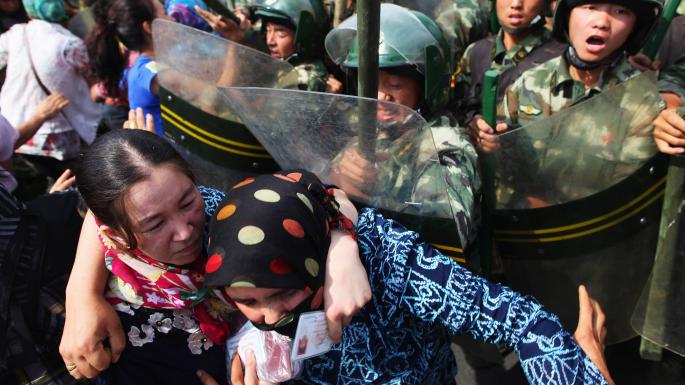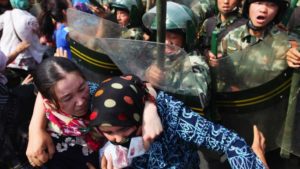Early breakfasts and no alcohol get China’s Uighurs sent for re-education

The Times UK, 7 October 2018
 By Amy Hawkins – At the southeastern corner of the China nationalities museum in Beijing, the Uighur “ethnic landscape” is looking worse for wear. The paint along the walkway is peeling and cracks have appeared in the dusty pottery houses that are designed to exhibit the traditional culture of the Uighur people.The museum’s mission is “to promote unity of all Chinese ethnic groups”. More than 1,500 miles away in the Uighurs’ native province, Xinjiang, the Chinese state is taking a more direct approach to unity.
By Amy Hawkins – At the southeastern corner of the China nationalities museum in Beijing, the Uighur “ethnic landscape” is looking worse for wear. The paint along the walkway is peeling and cracks have appeared in the dusty pottery houses that are designed to exhibit the traditional culture of the Uighur people.The museum’s mission is “to promote unity of all Chinese ethnic groups”. More than 1,500 miles away in the Uighurs’ native province, Xinjiang, the Chinese state is taking a more direct approach to unity.
Reports from foreign media, the UN, Human Rights Watch and other NGOs emerged this summer of the extrajudicial detention of more than one million Uighur people in “re-education” camps across the region. Last week there were further reports of preparations for mass deportation.
The paradox is that, while locking up one in every 12 Uighurs, according to the reports, the government is promoting their culture as a tourist commodity.
There are 56 displays — each dedicated to one of China’s ancient ethnic minorities — in the nationalities museum, which is spread over vast gardens in the shadow of Beijing’s Olympic village. The Uighur exhibit sits atop a small hill with a clear view of the Bird’s Nest stadium, one of modern China’s proudest symbols of achievement.
Although the museum makes scant mention of it, the Uighur are a Muslim minority. Xinjiang, in the far west of the country bordering central Asia, is seen from Beijing as a restive region. There were deadly riots in 2009, and 39 people were killed in a terrorist attack in 2014, one year after Xi Jinping became president.
The camps are part of his government’s retaliatory “strike-hard campaign against violent activities and terrorism”. But a recent Human Rights Watch report detailed some of the many reasons unconnected to violence or terrorism for which a Uighur could be sent for re-education.
These include abstaining from alcohol, having a watch set to the time in Urumqi (Xinjiang’s capital) rather than Beijing time, travelling abroad, speaking to someone who has travelled abroad, eating breakfast before sunrise, not carrying a government ID card, owning a tent and wearing a hijab.
Once inside, inmates are forced to recite Communist Party mantras, praise Xi and renounce their religion. There are widespread reports of torture and overcrowding.
The government denies that the camps exist, despite an increasing number of first-person accounts from former inmates, prison guards and relatives of detainees. When pressed by the UN, however, it said that “those deceived by religious extremism . . . shall be assisted by resettlement and re-education”.
The detention policy, pervasive surveillance and a crackdown on religious practice are seen by some as an attempt at cultural erasure. Yet the government also promotes a tourist version of Uighur culture.
“Chinese authorities are OK with certain forms of Uighur cultural expression, provided they can be controlled and exploited for tourism purposes,” said Gene Bunin, a research scholar at the Ronin Institute in America, who learned the Uighur language and lived for several years in Xinjiang.
Eight years ago, at Beijing’s initiative, Unesco inscribed the meshrep — a traditional Uighur gathering involving music and dance — into its list of “intangible cultural heritage in need of urgent safeguarding”.
Yet more recently the Chinese authorities insisted that some meshreps include a Chinese children’s pop song, Little Apple, and celebrations of the Communist Party. Unesco safeguarding “has become a tool in a propaganda campaign”, claims the Uighur Human Rights Project (UHRP), a Washington-based NGO.
“The government’s policies have gone from paying lip service to diversity while being assimilationist in practice to open forceful assimilation in the case of the Uighurs,” Nicole Morgret, UHRP project manager, told The Sunday Times.
Some Uighur cultural expression is still tolerated, but only on state-sanctioned terms and in a way that many scholars of China have called superficial.
James Leibold of La Trobe University in Melbourne — an expert on Chinese ethnic policy — said Xi had given a portent of the “erasure and museumification of minority cultures” in a speech in 2014 in which he said: “We shouldn’t continue with what is rotten but rather discard the dross and select the essence; weed out the chaff to bring forth new roots.”
On the other side of Beijing to the nationalities museum, a young couple prepare to have their wedding photographs taken. The man is dressed in a long red jacket and a gold taqiyah, an Islamic rounded skullcap, while the woman wears an extravagant red dress threaded with gold embroidery and a matching hijab.
They are Beijing Muslims of the more accepted Hui minority, and they are a picture-perfect example of an aesthetic synthesis that the government celebrates.
The setting for the photoshoot is Niujie Mosque, the city’s oldest and largest, which has been a functioning religious site since 996. The architecture is predominantly Han (the dominant Chinese ethnicity), with flashes of Arabic. It bears more similarity to a traditional Chinese temple than to a mosque.
Prayers are still held five times a day in a hall which is off-limits to non-Muslims, who buy a ticket to look around the rest of the site. The mosque is largely supported by the ticket sales.
An attendant says that they receive roughly the same number of worshippers and tourists each day. Another confides: “It’s not easy to be a Muslim in China.”
A Hui Muslim and a Beijing local, he asks that his name not be used, citing an “unfavourable” environment in China. He is happy to show guests around, however.
“We are all the same, black or white, we are all peaceful,” he says, but he is not hopeful about the future of Islam in China. He had more freedom when he was younger, but these days “communism doesn’t like religion”.

